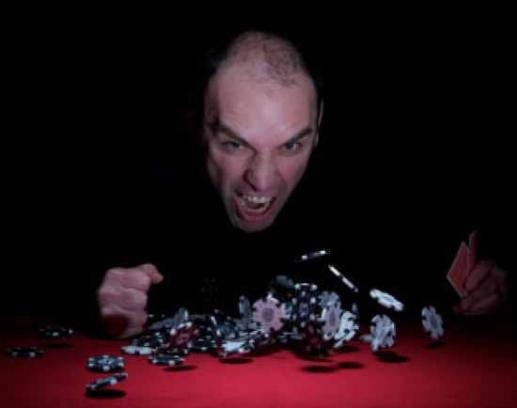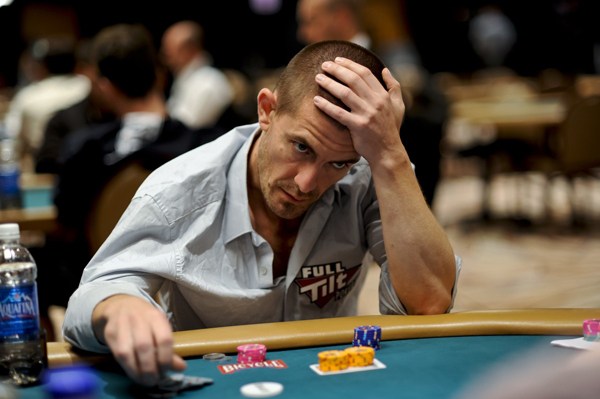- PokerListings »
- Poker Strategy »
- Poker Psychology »
- The Psychology of Poker: Tilt
The Psychology of Poker: Tilt

Poker is a game of strategy and wits. You need your mind on peak performance, so don’t let it slip.
Does any of this sound familiar to you?
“He already got lucky 3 times, no way he’s lucky again!”
“This is not quite the hand I should play here, but I’m sure it will be fine. I need to make some moves now.”
“I’m down half my stack, I need to increase my action.”
All these can be signs of “tilt”.
In Poker, tilt describes a state of mental unclarity, where someone’s judgement is impaired, which leads them to make suboptimal decisions. The cause of this can be anger, fear or just frustration, be it because of an unlucky occurrence, a run of bad luck in general or maybe even something that doesn’t have anything to do with the game at all.
Why Is It Bad to Be On Tilt
Tilt can be extremely detrimental to a poker player's performance and overall success, for several reasons:
- Tilt can cause players to make impulsive and irrational decisions, such as going all-in with a marginal hand or calling a bet with an inferior poker hand. These decisions can be costly and result in significant losses.
- Tilt can lead to a lack of focus and concentration, as players may become distracted and preoccupied by negative thoughts and emotions. This can lead to mistakes and missed opportunities at the table.
- Tilt can result in a lack of discipline and control, as players may become careless and take unnecessary risks. This can lead to a significant erosion of a player's bankroll over time.
- Tilt can impact a player's mental and emotional well-being. It can lead to feelings of frustration, anger, and disappointment, which can be harmful to overall mental health and happiness.

- Tilt can be contagious and have a negative impact on other players at the table. If one player is on tilt, it can create a negative atmosphere and disrupt the dynamic of the game.
- Tilt can be costly in terms of time and money. A player on tilt may spend more time at the tables, trying to recoup losses, and may end up losing even more money as a result.
- Tilt can lead to a lack of enjoyment in the game. When on tilt, players may not be able to fully appreciate and enjoy the game, which can take the fun out of playing poker.
In short, tilt is a dangerous and destructive state for poker players to be in, as it can lead to poor decision-making, lack of focus and discipline, negative emotional states, and overall decreased enjoyment of the game. It is important for players to recognize when they are on tilt and to take steps to prevent it from happening or to manage it when it does occur. How you play poker is not just about knowing strategy it also demands calm zen-like mental state.
How Do You Know When You’re on Tilt?
It is important for players to be able to identify when they are on tilt, so that they can take steps to prevent it from affecting their game. Here are some signs to watch out for that may indicate that you are on tilt:
- Irrational or impulsive decisions: If you find yourself making decisions that you wouldn't normally make, such as going all-in with a marginal hand or calling a bet with an inferior hand, it may be a sign that you are on tilt.
- Lack of focus and concentration: When on tilt, players may become easily distracted and unable to concentrate on the game. This can lead to missed opportunities and mistakes at the table.
- Loss of discipline and control: Tilt can lead to a lack of discipline and control, as players may become careless and take unnecessary risks. This can result in significant losses and erosion of a player's bankroll.
- Negative emotions: Players on tilt may experience negative emotions such as frustration, anger, and disappointment. These emotions can be a sign that you are not in a mental state to make good decisions at the table.
- Inconsistency in play: Tilt can lead to inconsistency in a player's game, as players may deviate from their normal strategy and make inconsistent decisions.
- Increased time at the tables: Players on tilt may spend more time at the tables, trying to recoup losses, which can lead to even more losses over time.
- Lack of enjoyment in the game: When on tilt, players may not be able to fully enjoy and appreciate the game, which can take the fun out of playing poker.
To identify tilt, it is important to pay attention to your thoughts, emotions, and behaviors while playing poker. If you notice any of the above signs, it may be a sign that you are on tilt and should take steps to prevent it from affecting your game.
How to “Untilt” Yourself
If you catch yourself playing on tilt, the most important thing is to take a step back.
Take a deep breath and get up, take a walk, clear your head. Calmed down a little? Good, then let’s move on.
It is crucial that you understand where your tilt is coming from.
Review Your Game
Usually, players will realize they are on tilt when they start losing money. In this case, it’s important to review the plays you made, that lead you to this outcome:
- Did you follow your strategy?
- Did you get the correct read on your opponents?
- Did you calculate your risks correctly?
If these are the case, maybe you just had a run of bad luck. That happens.
We keep telling you to only play with money that you can afford to lose for a reason. If you just lost 20€ in a Texas Hold'em cash game, because your opponent was playing 7-2 and just so happened to catch a full house on the river, that is the epidemy of bad luck and there is not much you can do about that.
But ever so rarely these things happen, and you need to manage your budget accordingly to be profitable in the long run.

Did You Take Unnecessary Risks?
We have a bunch of guides on strategy and in every one of them we explain how to manage your risk. You need to keep in mind that real money poker is still based on statistics and risk management, so if you follow a strategy, it is vital that you don’t risk more on those moves than your strategy intends.
For example, making a 3 Barrell Bluff is meant to make your opponent fold. But there is a chance that he just hit the nuts and will happily call whatever you throw at him. In those situations, it is important to cut your losses and move on.
So What Now?
If any of those things seem to fit, take a break. Rethink your strategy, rethink your money management and reflect on your state of mind. Nobody is born a pro. These things take time and experience. Stop playing for the day, maybe read one of our guides on how to become a better player and start fresh tomorrow. Maybe even on a new Online Poker Site– fresh start, clean slate.
Reflect on Your Triggers
Having analyzed the situation and hopefully understanding where you slipped up, there are a few more things that you need to consider before making your next big plays.
First and foremost, you have to understand what triggered you and in what way.
We often get angry as a response to fear, be it losing our stack to something that’s out of our control, like having to wait longer than average for a playable hand and therefore starting to make irrational plays, or maybe the fear of our gut-feeling being wrong and therefore our perception of our skill isn’t as good as the reality.
It is imperative, that you understand that poker is a game of statistics and therefore, a winning streak or a stroke of luck is just as likely as a losing streak. The only way to go is to stay rational about it and keep your feelings out of it, essentially staying cool-headed and calculating.
At the same time, you need to be aware of your thoughts and feelings and realize when you’re feeling more anxious or angry than you should. Recognizing these triggers and dealing with them in the appropriate way – whatever is necessary from taking a deep breath to switching off your computer and calling it a day – will be the key to a more consistent and therefore more successful Poker play.
Your Mental Health Plays a Big Role
Some people may not like to hear this, but your mental health is a very important factor when it comes to tilting.
Your extend and your resilience to tilt may be a lot different from someone that explodes at every little inconvenience, while someone with the mental fortitude of a mountain may not be emotionally affected by anything at all.
This does lead to two big conclusions that have to me made:
You Need to Determine Your Mentality
So, which one of those personalities do you tend to lean towards?
It will help you a lot if you can understand your own mentality and how you react to stressful situations. If you know that you get angry or frustrated easily, you will have to watch out for signs of tilt a lot more often than if you tend to be a person that can practically hold their Zen during periods of stress.
It helps to be aware of your mental state in your everyday situations. How do you react when boss yells at you? Do you stay calm and apologize, just going on with your daily routine unphased or do you feel like smashing something? Or do you even yell back? How about when some unexpected expenses are coming your way? Do you calmly start calculating or do you feel the need to vent first?
The better you understand your own mental fortitude, the easier it will be to figure out how much effort you will need to invest to keep yourself from tilting.
As an additional bonus: Once you understand which signs you are looking for, you can keep an eye out for them not only on yourself, but also on your opponent. Although some may think of this as morally questionable, if you can see signs of tilt on your opponent, some “words of encouragement” might be enough to give you a significant advantage. In those cases, make sure to bluff less, because your chances to be called will increase significantly, but in return make sure to play more aggressive if you manage to hit a strong hand. Moves like the Limp Re-Raise may be especially effective here.

Increase Your Mental Fortitude
We talk a lot about strategy and how to beat your opponent, but an aspect that is often not talked about enough is your own mental health.
You won’t send a scrawny 70kg-Fighter to compete against McGregor. But with enough training, a healthy diet, enough sleep and motivation, the competition could be fair one day.
We therefore we need to consider some more elements, that are rarely talked about, that do play a big role and will ultimately improve your game:
- Get enough sleep: This is a big one and often neglected. If you play your sessions after a 12-hour shift full of stress and frustration in the middle of the night. You need the mental clarity to make rational and accurate decisions. If you play poker to relax, you can obviously do so whenever you like, but if you want to make proper progress and actually excel at the game, you will need to treat it as a difficult challenge that you need to be in the right headspace for.
- Balance your diet: Another point that is often tossed aside as it has nothing to do with poker, right? The truth is, is you want to be on top of your game, this does in fact play a major role. It starts at the consumption of sugar and caffeine: If your insulin levels are permanently majorly elevated, you will not be able to function on your peak performance when you need to. If you keep your body functioning on caffeine all day, eventually your body will build up a resistance, which may also inhibit your peak performance. The key is to limit the intake to a reasonable amount and at reasonable times. If you’re starving yourself while playing, your focus will be suboptimal, because your brain will be craving food, At the same time, being completely stuffed with greasy and heavy food, your body will be focused on digestion a lot, which will make you a little more lethargic and reduce your ability to focus. Again, the key is a good balance, which also leads to the next point:
- Do some physical exercise: If you think we’re hitting the point of ridicule, let me tell you about the correlation between body and mind. While your brain does consume more energy during stressful situations, it also releases several stress-hormones, essentially preparing your body for a state of emergency – which may lead to some degree of a fight or flight response. The more you exercise, the more your body is prepared to handle those stress-related situations and you will therefore not only minimize physical symptoms like shaking or sweating, but also allow your mind to keep up the focus, as you don’t need to worry about handling the effects on your body as much. You don’t need to become a gym-bro, it’s enough to some pushups and pullups or go for a run every now and then.
- Meditation: The last point on this list. Even though traditional meditation does have proven benefits on mind and body, “meditation” can be anything that relaxes you and puts you in a good mental place. Some people might like to look at some pictures of cats, some might like to close their eyes and listen to music and others might like to go for a run before a big event or even before Playing Online Poker. Meditation can be whatever relaxes your mind and puts you in a good state to tackle your challenges.
Everyone, including Poker Players, will increase their odds when tackling difficult tasks as their best selves. If you struggle with tilt, maybe try something mentioned here. The result may surprise you.















